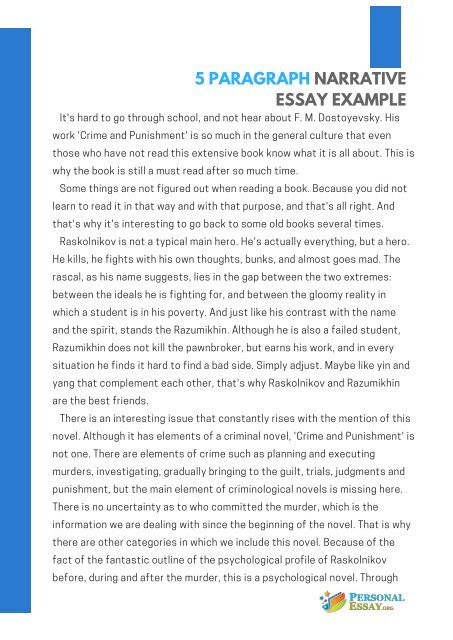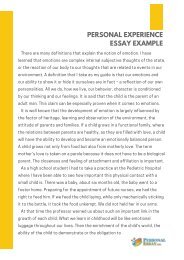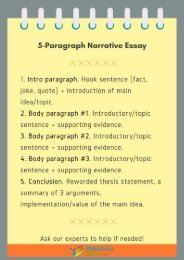5 Paragraph Narrative Essay Example
Check this 5 paragraph narrative essay example. http://www.personalessay.org/what-is-5-paragraphs-narrative-essay/
Check this 5 paragraph narrative essay example. http://www.personalessay.org/what-is-5-paragraphs-narrative-essay/
Create successful ePaper yourself
Turn your PDF publications into a flip-book with our unique Google optimized e-Paper software.
5 PARAGRAPH NARRATIVE<br />
ESSAY EXAMPLE<br />
It's hard to go through school, and not hear about F. M. Dostoyevsky. His<br />
work 'Crime and Punishment' is so much in the general culture that even<br />
those who have not read this extensive book know what it is all about. This is<br />
why the book is still a must read after so much time.<br />
Some things are not figured out when reading a book. Because you did not<br />
learn to read it in that way and with that purpose, and that's all right. And<br />
that's why it's interesting to go back to some old books several times.<br />
Raskolnikov is not a typical main hero. He's actually everything, but a hero.<br />
He kills, he fights with his own thoughts, bunks, and almost goes mad. The<br />
rascal, as his name suggests, lies in the gap between the two extremes:<br />
between the ideals he is fighting for, and between the gloomy reality in<br />
which a student is in his poverty. And just like his contrast with the name<br />
and the spirit, stands the Razumikhin. Although he is also a failed student,<br />
Razumikhin does not kill the pawnbroker, but earns his work, and in every<br />
situation he finds it hard to find a bad side. Simply adjust. Maybe like yin and<br />
yang that complement each other, that's why Raskolnikov and Razumikhin<br />
are the best friends.<br />
There is an interesting issue that constantly rises with the mention of this<br />
novel. Although it has elements of a criminal novel, 'Crime and Punishment' is<br />
not one. There are elements of crime such as planning and executing<br />
murders, investigating, gradually bringing to the guilt, trials, judgments and<br />
punishment, but the main element of criminological novels is missing here.<br />
There is no uncertainty as to who committed the murder, which is the<br />
information we are dealing with since the beginning of the novel. That is why<br />
there are other categories in which we include this novel. Because of the<br />
fact of the fantastic outline of the psychological profile of Raskolnikov<br />
before, during and after the murder, this is a psychological novel. Through
narrative or methodology like the inner monologue, we see exactly how<br />
Raskolnikov from quiet student became a paranoid of disrupted nerve. And<br />
his inner monoliths just lead us to another dimension of this novel, which is a<br />
novel idea or a philosophical novel. Following the Raskolnikov's thoughts, we<br />
find no unusual development of an idea, but an integral discussion in his<br />
head. So often when we talk about 'Crime and Punishment' we are talking<br />
about an internal dialogue that 150 years ago opened some of the topics we<br />
are still discussing today.<br />
If Raskolnikov could argue with himself, we can argue with Raskolnikov and<br />
his ideas. Better if we use his own words, or if we quote. One of the most<br />
well-known discussions is that of 'ordinary' and 'unusual' people. Ordinary is<br />
not necessary to explain, it's people like Alyona Ivanovna, the old<br />
pawnbroker, or his mother. People who are not destined for anything. But<br />
they are unusual like Napoleon Bonaparte. People who are entitled to great<br />
goals and make decisions about other lives. Not only that Raskolnikov<br />
justifies the murder of the lady, of these "human ears," with higher goals, but<br />
we are surprised by the accuracy of his allegation. Is Columbus still a great<br />
man if we take into account the number of people killed after the European<br />
invasion in America and the number of people still living in the reserves<br />
today? If we are going to the extreme, did not Hitler think he was working for<br />
a noble goal? These are some of the discussions leaving with the reader long<br />
after he finished the piece.<br />
Although it was found out that Raskolnikov was a murderer and that he was<br />
sentenced to Siberia to serve his sentence, we cannot say that the end was<br />
necessarily tragic. Somewhere between the first and the last page,<br />
Raskolnikov meets a prostitute Sonia and falls in love with her. The story of<br />
Sonia is also much more complex than it sounds, Raskolnikov first admitted<br />
the sins to her, surrender to her begging, and she is the one responsible for<br />
Raskolnikov's inner peace that he achieves in the end. Sonia represents<br />
love, guides the Raskolnikov's acquaintance with faith and she is the one<br />
who reads the Gospel. Through Sonia, Raskolnikov meets God himself, and<br />
with the imprisonment in Siberia the novel gets a note of kind of happy<br />
ending.









